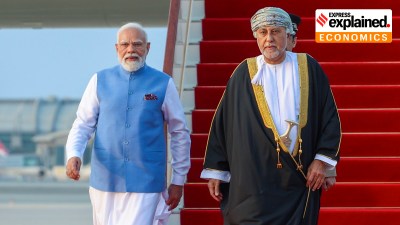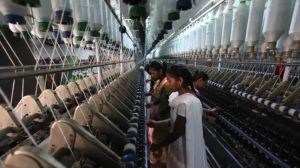US tightens visa rules for international students: Key highlights
In 2024, the US hosted about 1.6 million international students on F visas, 3,55,000 exchange visitors on J visas, and 13,000 media professionals on I visas.
 – The US Citizenship and Immigration Services (USCIS) has directed officers to scrutinise applicants’ conduct, immigration history, family ties, and any association with anti-American or terrorist ideologies (Express photo by Pradeep Kochrekar/ representative)
– The US Citizenship and Immigration Services (USCIS) has directed officers to scrutinise applicants’ conduct, immigration history, family ties, and any association with anti-American or terrorist ideologies (Express photo by Pradeep Kochrekar/ representative)The US government has tightened the rules for granting and renewing student visas, introducing stricter scrutiny of applicants’ backgrounds, ideological leanings, and immigration history. The move, backed by fresh policy guidance from the US Citizenship and Immigration Services (USCIS) and a proposed regulation under the Trump administration, could make it harder for international students, exchange visitors, and foreign journalists to study, work, or report from the United States.
Key highlights
– The US government has issued new policy guidance tightening norms for granting and renewing student visas.
– The US Citizenship and Immigration Services (USCIS) has directed officers to scrutinise applicants’ conduct, immigration history, family ties, and any association with anti-American or terrorist ideologies.
– The manual specifies that any endorsement, promotion, or support of anti-American or antisemitic ideologies or terrorist organisations may lead to visa denial or revocation.
– Officers have been asked to apply discretionary analysis, weighing both positive and negative factors, before approving student visa applications.
– A proposed Trump-era regulation seeks to introduce fixed durations for non-immigrant visas:
a) F visas for international students and J visas for cultural exchange visitors capped at four years
b) I visas for journalists capped at 240 days, and 90 days for Chinese and Hong Kong passport holders
Currently, such visas are valid for the duration of the academic programme or US-based employment, offering more flexibility.
– Visa holders would need to apply for extensions to stay beyond the fixed periods, creating additional hurdles for students, researchers, cultural workers, and foreign journalists.
In 2024, the US hosted about 1.6 million international students on F visas, 3,55,000 exchange visitors on J visas, and 13,000 media professionals on I visas.
The Trump administration argues that fixed terms are needed to better monitor and oversee visa holders while in the US.
Immigration watchdogs and groups like NAFSA, representing 4,300 global educational institutions, have previously opposed such proposals, warning they could hurt America’s standing as a global education hub.
This move comes alongside a broader Trump-led immigration crackdown, including:
– Revocation of over 6,000 student visas for overstays and violations.
– Increased scrutiny of H-1B visas, with US officials branding the programme a scam for allegedly taking away American jobs.
– Resumption of neighbourhood visits to check citizenship applicants’ “residency, moral character, and commitment to American ideals.”
- 01
- 02
- 03
- 04
- 05































